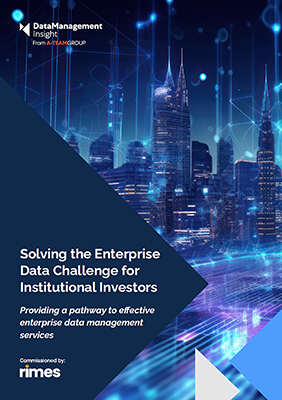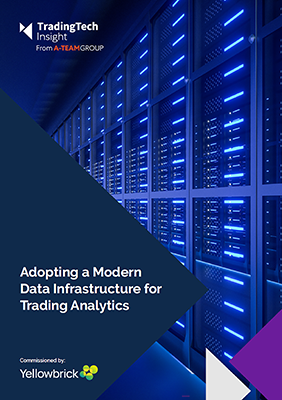A-Team Insight White Paper
The Evolution of Enterprise Data for ESG
Until recently, ESG data was regarded as a peripheral concern among data managers. Today, it is a vital part of an institution’s operations, needed by front- and back-office teams, putting huge new responsibilities on chief data and sustainability officers. Incorporating this new generation of data into institutions’ infrastructures, however, has been a challenge. Many on-prem...
Trading in the Public Cloud: Attitudes to Cloud Adoption in Capital Markets
Capital markets have been slow to embrace cloud technologies and in particular the public cloud. Practitioners have been wary of issues around speed/performance, privacy and cost, all of which can dampen the appeal of cloud technologies for trading firms. But broad acceptance of cloud beyond finance is highlighting some compelling benefits, primarily in terms of...
Solving the Enterprise Data Challenge for Institutional Investors
Institutional investors are evolving under pressure from a range of emergent externalities that are prompting many to assume new roles and processes, some of which have traditionally been the preserve of asset managers. Enabled by data-led technology, they are making more direct investments and managing their portfolios in-house. At the same time, they are streamlining...
How Banks Harness the Value of Cloud for Scale and Agility
Financial services are recognizing the benefits that data-led processes can bring and are undergoing digital transformations that are putting data at the heart of their operations and decisions-making processes. They are seizing on data as an asset whose value can be unlocked through technology to increase revenue and reduce costs across the entire enterprise. With...
Getting Control of Access to Key Market Services
Use of single dealer portals that allow banks to trade assets on behalf of their clients is growing rapidly, particularly among firms in the fixed income and foreign exchange markets in particular. But while trading portals offer great benefits in terms of broader market reach and enhanced client functionality, they bring risks too. Firms are...
How to Build an Efficient Enterprise ESG Data Strategy in Banking with Cloud and Machine Learning
ESG investing is now integral to financial institutions’ activities, motivated by client demands for sustainable investment options, regulatory obligations and a growing cultural shift towards ensuring that capital is allocated in order to do better for the planet and the people on it. Data is the magic dust that is enabling the translation of that...
The Business Case for Master Data Management Transition Within Financial Institutions
Master data management ensures the creation of a “single source of truth” of information for banks and financial institutions that not only provides that the data remains intact but also makes it available and useable across the entire enterprise. Once the information foundation of golden data is established with MDM, the data can be used...
Achieving a 360-degree View of Risk with Data-Driven Insights and Strategies
Technology and data have reached a level of sophistication that is enabling financial institutions to calculate and manage the risks to which their activities and investments are exposed. Leveraging the two, however, is a challenge; if the data isn’t properly managed, the technology that identifies patterns and insights may be unable to operate optimally. One...
Best Practice Approaches to Cross-Product Market Surveillance
As perpetrators of financial crime become more sophisticated, regulators worldwide are focusing more of their efforts on cross-product and cross-market manipulation, as evidenced by a growing number of high-profile prosecutions. Led by the UK’s FSA and the EU’s ESMA, regulators in key global markets are targeting sophisticated operators, whose cross-product activities typically involve are able...
Adopting a Modern Data Infrastructure for Trading Analytics
As they seek an edge in their trading and investment activities, hedge funds and other sophisticated trading firms are looking to harness new sources of insight that can allow them to identify and exploit emerging market and industry opportunities. But many organizations are saddled with a disconnected sprawl of legacy systems that are unable to...










